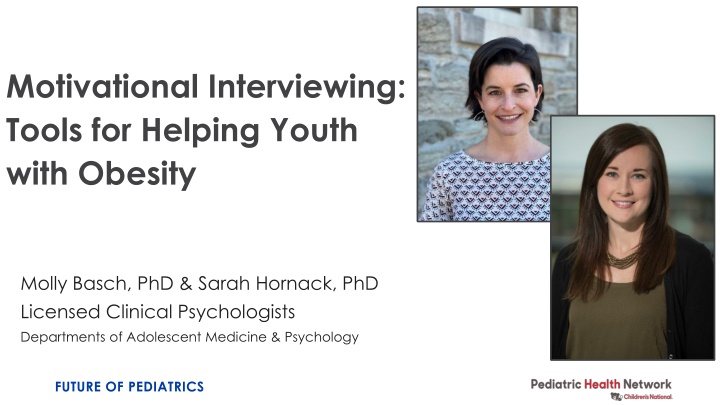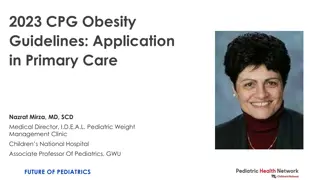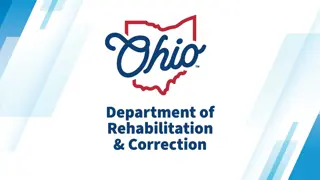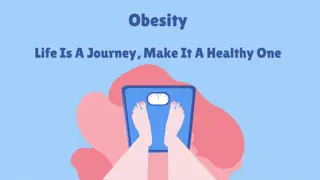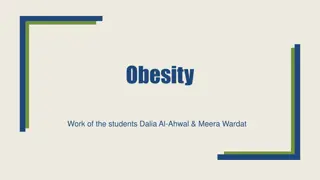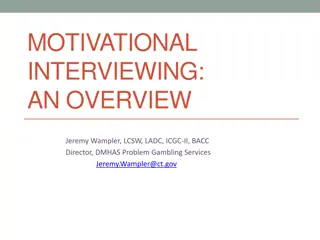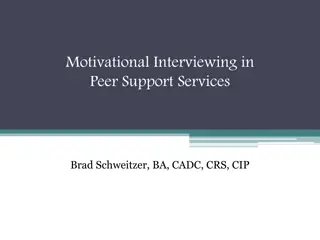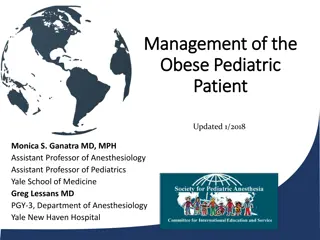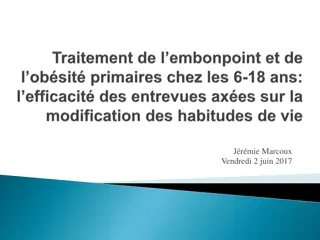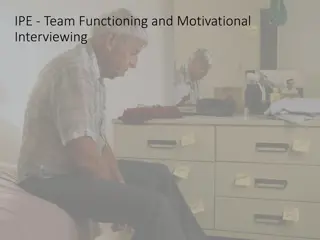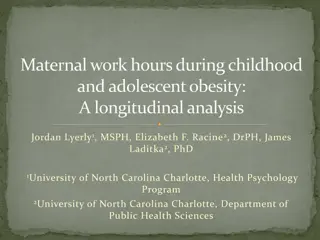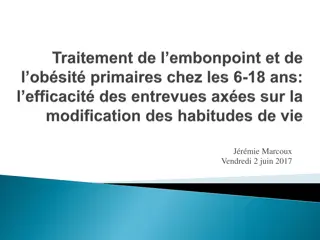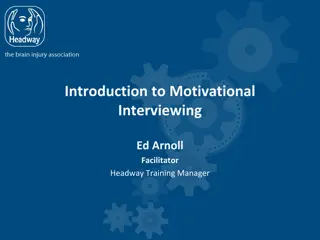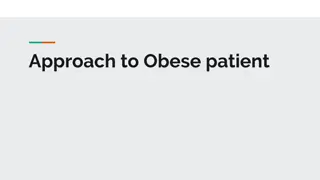Motivational Interviewing Tools for Youth Obesity
Explore how Motivational Interviewing (MI) can support youth with obesity through collaborative conversations to enhance motivation and commitment to change. Learn about MI principles, research evidence, and the key facets of this approach. Discover the impact of MI skills acquisition on exercise, weight loss, and screen time reduction in pediatric care.
Download Presentation

Please find below an Image/Link to download the presentation.
The content on the website is provided AS IS for your information and personal use only. It may not be sold, licensed, or shared on other websites without obtaining consent from the author.If you encounter any issues during the download, it is possible that the publisher has removed the file from their server.
You are allowed to download the files provided on this website for personal or commercial use, subject to the condition that they are used lawfully. All files are the property of their respective owners.
The content on the website is provided AS IS for your information and personal use only. It may not be sold, licensed, or shared on other websites without obtaining consent from the author.
E N D
Presentation Transcript
Motivational Interviewing: Tools for Helping Youth with Obesity Molly Basch, PhD & Sarah Hornack, PhD Licensed Clinical Psychologists Departments of Adolescent Medicine & Psychology FUTURE OF PEDIATRICS
Conflict of Interest Presenters have no conflicts of interest to report. FUTURE OF PEDIATRICS 2
Objectives Define Motivational Interviewing (MI) Highlight research evidence Discuss key facets of the approach Present brief model for MI FUTURE OF PEDIATRICS 3
Motivational Interviewing (MI) According to Miller & Rollnick, this practice is a collaborative conversation style for strengthening a person s own motivation and commitment to change The spirit of MI: Autonomy Collaboration Evocation FUTURE OF PEDIATRICS 4
MI Research Support Resnicow et al. (2016) found that brief MI offered by pediatricians led to clinically meaningful reductions in BMI 4 MD visits, 6 RD visits over 2 years Another trial found that pediatricians' acquisition of MI skills was associated with increased exercise, weight loss, and reduced screen time (Walpole et al., 2012) Many pediatricians desire training, and recent training is associated with increased self-efficacy and perceived effectiveness of MI (Kraftt et al., 2018) FUTURE OF PEDIATRICS 5
Primary MI Principles 1. Express Empathy Provide a secure and caring interpersonal context Considered a key component of psychotherapy 2. Develop Discrepancy Reflect on and magnify the discrepancy between a person s values and goals and their current behavior FUTURE OF PEDIATRICS 6
Primary MI Principles 3. Roll with Resistance Stop: Pause and consider the situation Drop: Let go of current approach Roll: Express understanding of youth/family point of view and emphasize personal choice 4. Support Self-Efficacy Actual behavior change happens when the behavior is seen as important and the individual feels able to make the change FUTURE OF PEDIATRICS 7
Group Reflection: word cloud What feelings does pediatric obesity treatment in primary care bring out for you? FUTURE OF PEDIATRICS 8
The Importance of Empathy Brene Brown on empathy (3 min. video): https://www.youtube.com/watch?v=1Evwgu369Jw FUTURE OF PEDIATRICS 10
Practical MI Tool - FliP Developed for implementation in primary care by the Family Lifestyle Program 15-minute intervention tool FUTURE OF PEDIATRICS 11
Weight-related language tips Least preferred terms: fat, morbidly or extremely obese, obese, large, chubby More preferred terms: weight, unhealthy weight, high BMI, plus size (girls) Be sensitive to individual differences: What words would you feel most comfortable with as we talk about your/your child's weight today? FUTURE OF PEDIATRICS 12
*May substitute in ratings on importance and confidence FUTURE OF PEDIATRICS 13
Recognizing Autonomy & Building Commitment If the family is not ready for major change, you may suggest: Making a very small change Thinking about change Coming back for another session FUTURE OF PEDIATRICS 15
Thank you! Questions? Sarah Hornack, PhD shornack@childrensnational.org, Molly Basch, PhD mbasch@childrensnational.org FUTURE OF PEDIATRICS 16
References Resnicow, K, Harris, D, Wasserman, R, et al. (2016). Advances in Motivational Interviewing for pediatric obesity: Results of the BMI2 Trial and Future Directions. Pediatri Clin North Am., 63(3), 539- 562. Walpole, B, Dettmer, E, Morrongiello, BA, et al. (2012). Motivational Interviewing to enhance self- efficacy and promote weight loss in overweight and obese adolescents: A randomized controlled trial. J Pediatr Psychol, 38(9), 944-953. Kraftt, C, Pat Frintner, M, Goodman, AB, et al. (2018). Pediatrician-Perceived Preparedness in Motivational Interviewing (MI) and Perceived Effectiveness in Counseling Children with Obesity [Poster]. Pediatric Academic Societies Annual Meeting. Pediatrician-Perceived Preparedness in Motivational Interviewing (MI) and Perceived Effectiveness in Counseling Children with Obesity (aap.org) Naar-King, S., & Suarez, M. (2021). Motivational interviewing with adolescents and young adults. The Guilford Press. Wood, A. (2020). Motivational interviewing workbook: Exercises to decide what you want and how to get there. Rockbridge Press. Daniel J. Fischer & Theresa B. Moyers (2014) Is There an Association Between Empathic Speech and Change Talk in Motivational Interviewing Sessions?, Alcohol Treat Q, 32(1), 3-18. DOI: 10.1080/07347324.2014.856225 FUTURE OF PEDIATRICS 17
June 21, 2023 FUTURE OF PEDIATRICS
